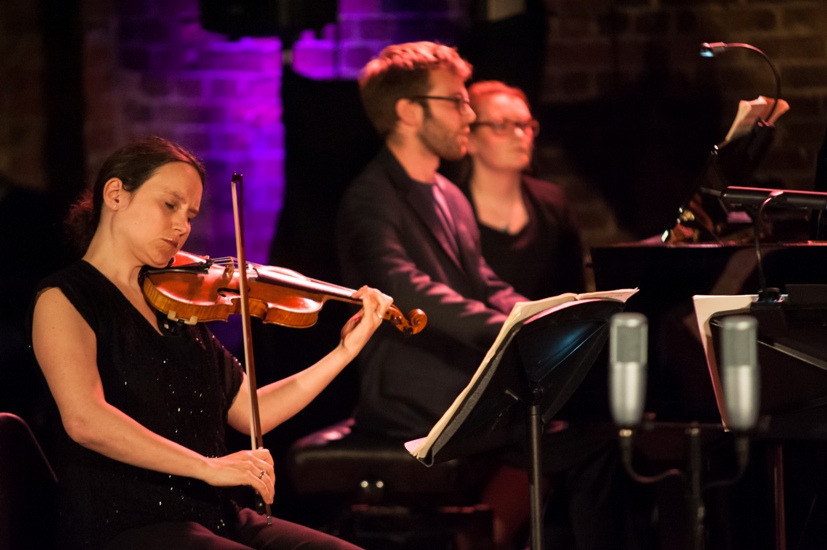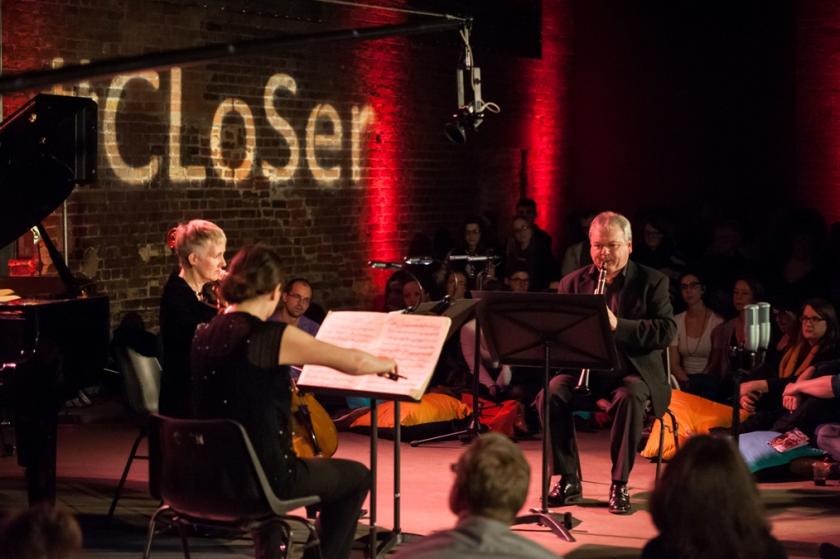Take a cushion or two among the beautiful young people gathered around the players – no Proms Arena crowd, this - pull up a chair or find your standing place; sit bolt upright, lie back, stretch your legs, tweet during the music if you like (an invitation thankfully declined). CLoSer’s latest concert in the friendly Village Underground is a rather far cry from the 1941 premiere of Messiaen’s Quatuor pour la fin du temps given before 400 of his fellow prisoners and guards, outside in the rain, in Stalag VIII-A, Görlitz (now Zgorzelec in Poland). Not in one crucial respect, though. Messiaen recalled that “never was I listened to with such rapt attention and comprehension”. This audience, very much of 2014 and in the heart of trendy Shoreditch, would at the very least have impressed him with its "rapt attention", too.
The reasoning is that if you give your listeners the freedom to do what they like, and the players are as top-notch as these – certainly there is none better than the City of London Sinfonia’s brilliant clarinettist-conductor Michael Collins, joined by CLS violinist Alexandra Wood, cellist Susan Dorey and a superb Messiaenic pianist in Antoine Françoise – then the communication will flow from the off and get the right response. And what a range Messiaen offers in his mostly gentle angelic Revelation. First, the energetic side: there are rolling unison dances as rhythmically varied as those in our fashionably brilliant Roma scene, the three or four players in the relevant movements here sounding like a stylish accordion. Later, what often comes over to me like lurex music from the full orchestra of the later Turangalîla Symphony simply dazzled here with trills around the cello going glissando-crazy in a convincing impersonation of the whooping ondes martenot.
 The third movement’s breathtaking clarinet solo was prefaced all the more movingly by Michael Collins in conversation with natural, easy CLoSer presenter Matthew Swann telling us how as a 16 year old he played it with Messiaen and got two pieces of wisdom: don’t listen to your own heartbeat – in other words, slow down as much as you can where the tempo demands it – and imagine every colour as you go from ppppp to fffff. The sound, as he did so, pierced and transfixed us all.
The third movement’s breathtaking clarinet solo was prefaced all the more movingly by Michael Collins in conversation with natural, easy CLoSer presenter Matthew Swann telling us how as a 16 year old he played it with Messiaen and got two pieces of wisdom: don’t listen to your own heartbeat – in other words, slow down as much as you can where the tempo demands it – and imagine every colour as you go from ppppp to fffff. The sound, as he did so, pierced and transfixed us all.
There were real colours, going jazzy on the brick wall behind, for the seventh movement’s “Tangle of rainbows, for the Angel who announces the end of time”. Messiaen’s beloved birdsong was well anticipated, too, first by the real thing on the sound system and then by Wood’s telling us how her first performance of the work had been in the Netherlands, preceded by a magical walk through the local woods to hear the daytime avian chorus.
Best of all were the meditations, with first Dorey and finally Wood backed up by timeless pulsing chords that were subtly freer than metronomic in the firm but gentle hands of Françoise (pictured with Wood above): here’s another young French pianist following David Kadouch’s recent recital triumph from whom I want to hear much more. If the two movements were in one sense perfect trance music for the occasion, “the mind is listening”, as William Carlos Williams wrote in lines brilliantly set by Steve Reich. As Wood and Françoise floated freely into the ether above the Village Underground, subtly lifting the roof and showing us the stars beyond the rainy cloud-canopy, I could think of nowhere I’d rather have been last night, and with no better company.














Comments
Add comment